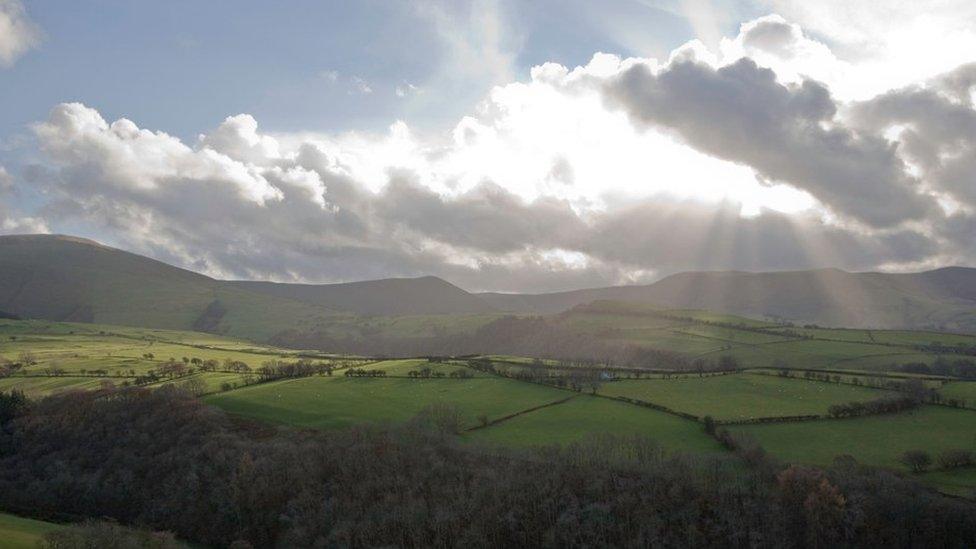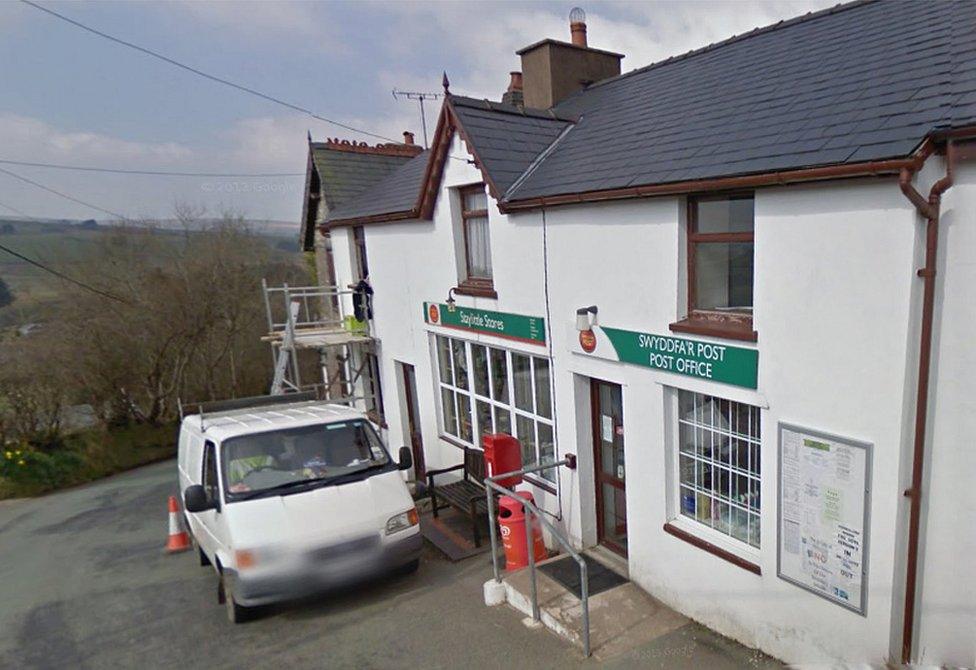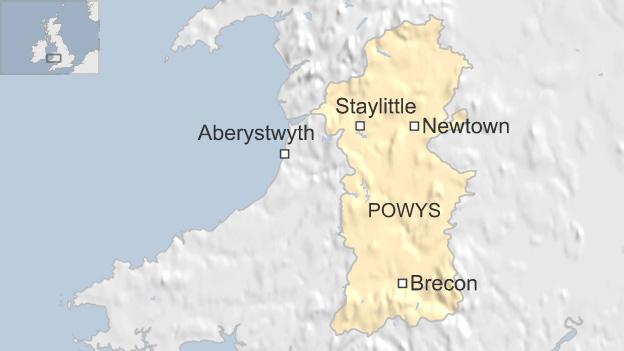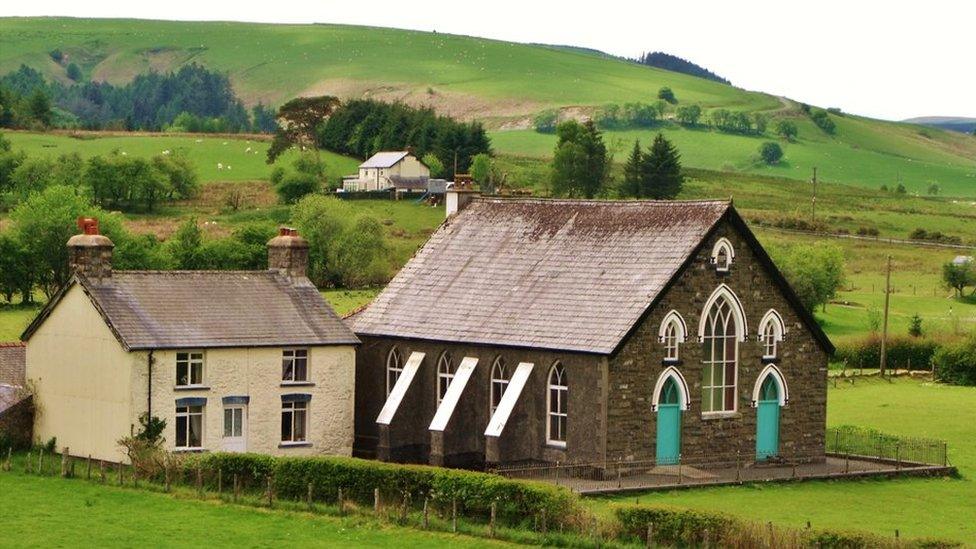Staylittle: The village that is cut off from the UK
- Published

Landscape near Staylittle
In the era of smartphone addiction, where people self-consciously take breaks from social media and announce "digital detoxes", there is one place in the UK that is getting rather annoyed at being cut off from the outside world.
The Welsh village of Staylittle can be found to the west of Newtown in Powys. It's an isolated place - the nearest market town is almost eight miles away. "Staylittle, which has remained outside the perimeter of progress and stayed little, is miles from anywhere," complained a reporter in the Times in 1965.
Fifty years might have passed since then but the village's communications are still tenuous.
It has no mobile reception. And because of this, most people in Staylittle - Penffordd las in Welsh - have to rely on their landlines to stay in touch with people. But a fortnight ago, the villagers were cut off.
Landlines went dead in at least 25 homes. Rosemary Hazlerigg, who has lived in Staylittle for 20 years, had to drive more than a mile to an area with patchy mobile phone signal to be able to ring BT Openreach to report the fault.
Ten days later, Staylittle was still waiting for the problem to be fixed. When you are as cut-off geographically as Staylittle, getting cut off in other ways is frustrating.

There is still one reliable way of contacting the outside world
"We don't have mobile phone reception and I can't get broadband up here either," says 72-year-old David Penn. "There are only about 140 names on the electoral register. I don't think there's any profit to be made up here to be honest so we just don't count."
The main conduit of communication is one working landline in the Post Office.
BT engineers have been working to fix the problem. They say that it appears that a recent thunderstorm was to blame for the damage to parts of the local network and that they hope to restore the full service this week.
It's not the first time that the phone lines have been knocked out by a thunderstorm. "The last time it was out for over a week, it was struck by lightning," says Penn.
Staylittle is an extreme example of a wider problem of getting adequate phone connections and broadband in rural areas. "We live in a digital age where we expect to communicate with our family, friends and customers," says Sarah Lee, head of policy at the Countryside Alliance. Rural businesses especially can be at a "massive disadvantage" if they do not have the means to keep in touch with their customers.

Inaccurate mobile phone coverage maps are part of the problem, adds Lee. "The coverage maps don't always reflect the topography, particularly in somewhere like Wales." Many people get a contract thinking that there will be signal in their area only to be disappointed.
The government says it is looking to improve the situation, external by providing up to £150m for mobile infrastructure in areas with no coverage from any networks.
The situation with broadband is also changing. The government's Broadband Delivery UK, external (BDUK) programme aims to provide superfast internet connections to 95% of the country by 2017. The government is still investigating how to get the other 5% connected.

Staylittle Baptist Chapel
Earlier this month, a report showed that nearly 79% of premises in Wales are now capable of receiving superfast broadband, up from 55% in 2014. But it also showed that Wales had the lowest availability of 4G services in the UK.
Lee argues that although improvements have been made, they are not happening fast enough to meet customer expectations. "I think some of it's really the age of the infrastructure," she explains. Some of the old cables need replacing and this can delay projects.
But even in remote Staylittle, not everybody has been cut off from all communication while they wait for the engineers. Some houses still have satellite broadband.
But emails are not all that useful in an emergency. "If there's a fire you can't really email the fire brigade and hope that they pick it up," says Adrian Roberts from the Staylittle Outdoor Centre.
Many of the people in the village are trying to put a humorous slant on a frustrating situation. "We always laugh around here that the best thing you can do is send a pigeon," he says.
In some ways, people in Staylittle have got used to the difficulties. Nearly two weeks without landlines is bad but the system is patchy at the best of times. Hazlerigg says that people often end up overhearing their neighbour's phone conversations. "We get the equivalent of a party line," she explains. "Sometimes it's been 'Hello, is that you Rosemary? I'm just talking to my mother.' It's like a conference call."
Hearing unexpected voices down the phone might be disconcerting but there is a more pressing issue that concerns her. The big problem with a bad phone line, she says is that it's becoming more noticeable.
"As more and more people need to communicate, there are assumptions in what I now call the outside world."
Recently, Hazlerigg tried to arrange a delivery but the company refused because they said they needed a working mobile phone number. "Unfortunately a lot of organisations seem to assume that everyone has a mobile and that that mobile has signal."
Some villagers have got tired of waiting for their phones to work and have gone back to older methods. David Penn's mother will turn 97 next month and they usually try to speak twice a day. "I have had to go back to writing her letters," he says.
"Every day I expect the call saying she's gone." It would be awful, he adds, if nobody could get hold of him.
It might seem inconceivable that somewhere in the UK could be so cut-off for so long, but to people in Staylittle it's just a new phase of a decades-old problem.
Subscribe to the BBC News Magazine's email newsletter, external to get articles sent to your inbox.